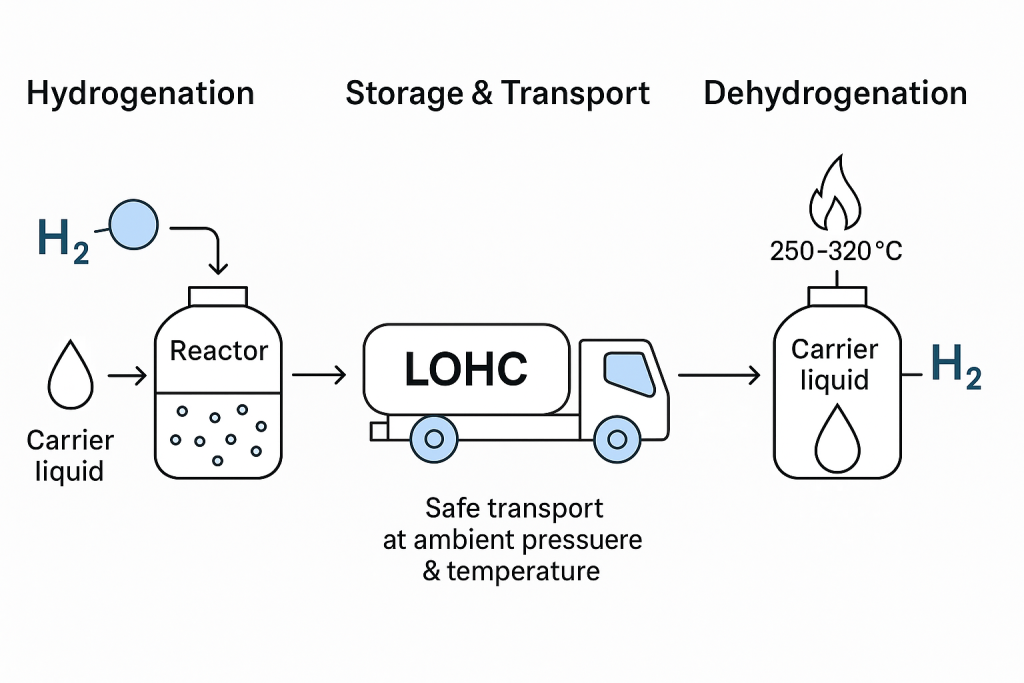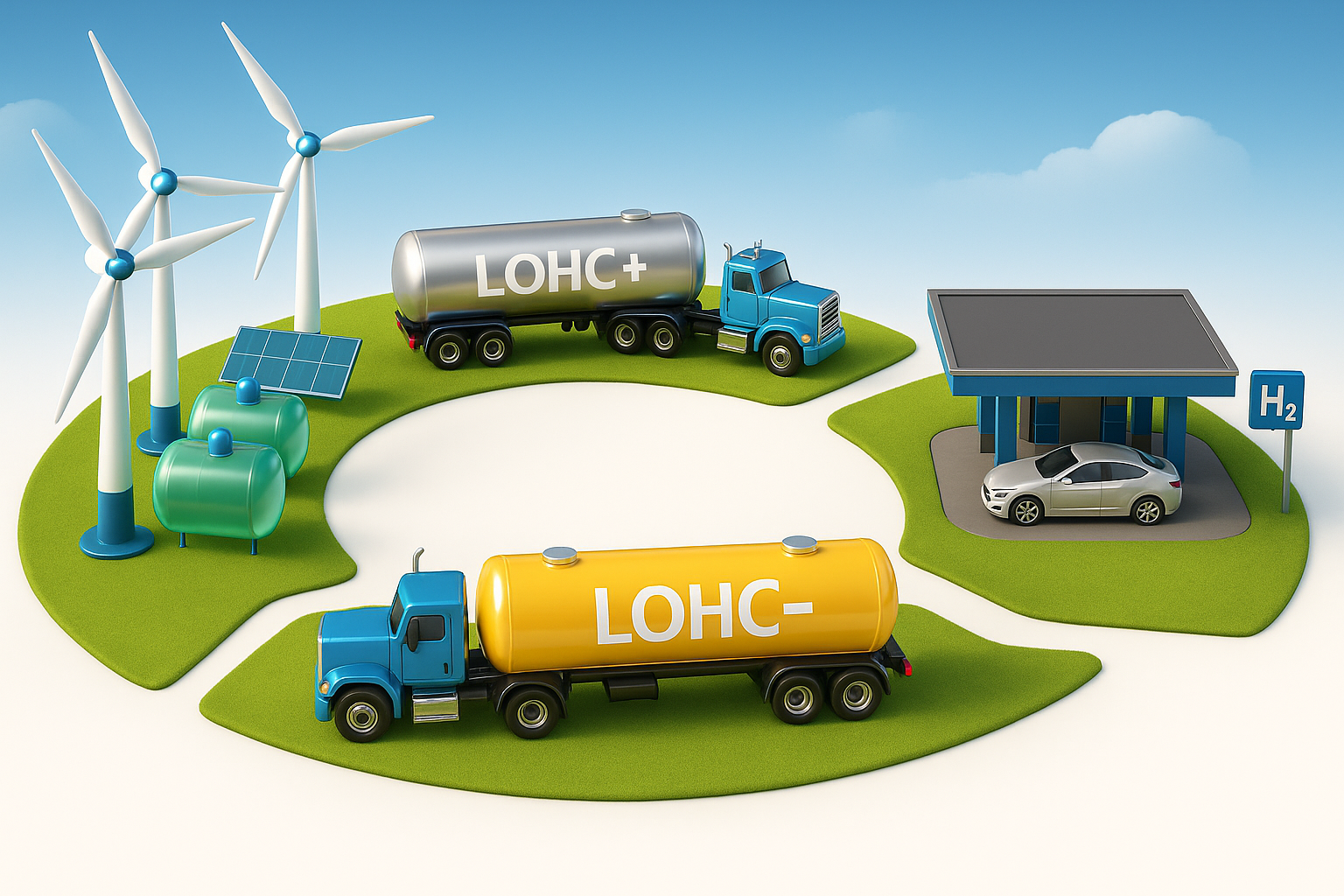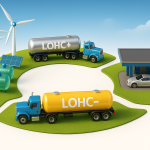This article reflects our perspective on how Liquid Organic Hydrogen Carriers (LOHC) could complement hybrid systems and our core innovations in thermal energy storage and heat-driven solutions.
Hydrogen in the Energy Transition
Hydrogen is widely recognized as a cornerstone of the clean energy transition. The International Energy Agency (IEA) notes that low-emission hydrogen will be vital for decarbonising heavy industry, long-distance transport, and seasonal energy storage [1].
But storing hydrogen safely and efficiently is still a major challenge. Compression, liquefaction, and underground storage all face drawbacks, from high energy demand to safety risks and geographic limits [2].
How LOHC Works
LOHC offer one alternative. Hydrogen can be chemically bound to a stable liquid at ambient conditions (hydrogenation) and later released using heat (dehydrogenation) [3].
Carriers such as dibenzyltoluene are reusable, stable, and liquid at room temperature. This means hydrogen can be transported like conventional fuels, in trucks, tanks, or even ships, without cryogenics or high-pressure systems [4][5].
LOHC turns hydrogen into a manageable liquid fuel, compatible with today’s infrastructure.

Opportunities
- Safer transport: No need for 700-bar tanks or –253 °C liquefaction [6].
- Infrastructure compatibility: Can flow through existing liquid-fuel logistics [3].
- Long-distance logistics: Easily shipped across oceans in chemical tankers [7].
- Applications: shipping, aviation, industrial buffering, district heating [5].
LOHC lowers barriers to moving hydrogen at scale.
Limitations and Challenges
- Efficiency penalty: Dehydrogenation requires 250–320 °C heat, reducing round-trip efficiency to ~30–40% [3][8].
- Catalyst cost: Platinum/palladium are expensive and durability is uncertain [4][8].
- Infrastructure maturity: Still at pilot stage; large-scale standards and supply chains not ready [6][7].
LOHC is promising but energy-intensive, costly, and not yet commercial.
Greenco Tech’s Perspective
At Greenco Tech AB, we don’t develop LOHC technology directly. Instead, we see it as an adjacent solution that could complement our core work in high-temperature thermal energy storage (TES) and our proprietary heat-driven heat pump (Thermal Booster).
- TES could supply the high-grade heat needed for LOHC dehydrogenation.
- Industrial waste heat, another Greenco focus, could unlock efficiency gains.
- In district heating, LOHC could act as a seasonal reservoir alongside TES and heat pumps.
Greenco understands where LOHC fits and how it can be integrated into hybrid energy hubs.
Conclusion
LOHC is not a silver bullet, but it could play a role in future hydrogen ecosystems when paired with other technologies.
At Greenco Tech, our strength is in evaluating and integrating such solutions. We bring together TES, advanced heat pumps, and emerging hydrogen pathways to build resilient, fossil-free energy systems.
If your organization is exploring hydrogen or hybrid energy storage, we’re ready to collaborate on feasibility studies and pilot projects.
Contact Us
Have questions or want to discuss collaboration opportunities?
Reach out to our Greenco Tech Support Team → Contact us
References
[1] IEA – Hydrogen : https://www.iea.org/energy-system/low-emission-fuels/hydrogen
[2] Oxford Institute for Energy Studies – The State of the European Hydrogen Market Report 2024: https://www.oxfordenergy.org/wpcms/wp-content/uploads/2024/06/2024-State-of-the-European-Hydrogen-Market-Report.pdf
[3] Fraunhofer ISE – “StoRelH2: Storage/Release H₂ – Efficient and cost-effective LOHC technology” https://www.ise.fraunhofer.de/en/research-projects/storelh2.html
[4] Preuster, P., Papp, C., Wasserscheid, P. Liquid Organic Hydrogen Carriers (LOHCs): Toward a Hydrogen-free Hydrogen Economy. Accounts of Chemical Research, 50(1), 74-85 (2017).
DOI: 10.1021/acs.accounts.6b00474
[5] Hydrogen Europe – LOHC Fact Sheet: https://hydrogeneurope.eu
[6] IEA – Global Hydrogen Review 2023: https://www.iea.org/reports/global-hydrogen-review-2023
[7] European Commission – A Hydrogen Strategy for a Climate-Neutral Europe (2020): https://eur-lex.europa.eu/legal-content/EN/TXT/?uri=CELEX:52020DC0301
[8] Teichmann, D., Arlt, W., Wasserscheid, P., & Freymann, R. (2011). A future energy supply based on Liquid Organic Hydrogen Carriers (LOHC). Energy & Environmental Science, 4(8), 2767-2773. DOI: 10.1039/C1EE01454D



